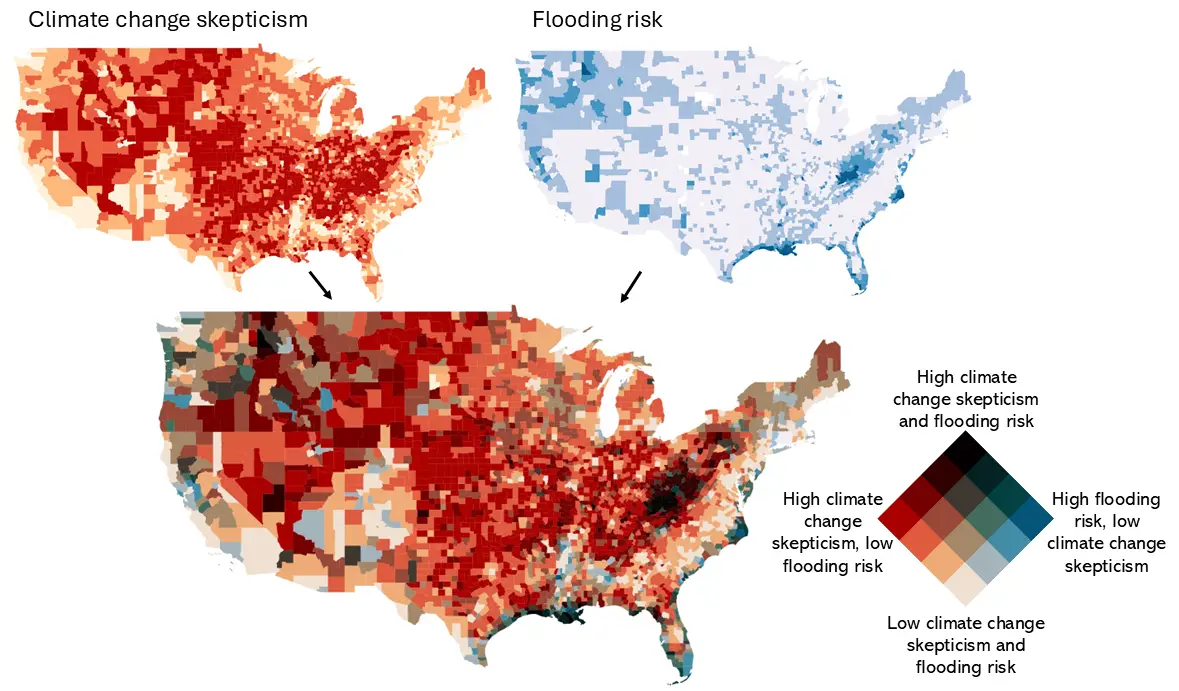Study reveals regions where denial of climate change amplifies flood risks, exposing populations to triple threats of disaster, social vulnerability, and inaction.
Flood Dangers Meet Denial: A Triple Threat with Deadly Consequences
A new study from the University of Michigan’s School for Environment and Sustainability warns of a critical overlap between high flood risk, social vulnerability, and climate change skepticism in parts of the United States. This combination, termed “triple exposure,” leaves communities unprepared and dangerously exposed to catastrophic flooding.
Researcher Joshua Newell, senior author of the study, expressed grave concern: “The communities most at risk of catastrophic flooding are the least prepared and the least likely to get prepared.”
Appalachia and Flood-Prone Regions Under Heightened Risk

The research highlights Appalachia, New England, and the Northwest as key regions facing these compounded risks. Many counties within these regions, already vulnerable due to low incomes and limited mobility, are further exposed by outdated Federal Emergency Management Agency (FEMA) flood risk assessments.
Adding to the crisis, these areas also harbor strong skepticism toward climate change, compounding the risk by hindering preventive actions. The study uses heatmaps of flood risk, climate attitudes, and social vulnerability, revealing dangerous hotspots where inaction could result in repeated devastation.
“Unfortunately, this paper has become timely,” said co-author Dimitrios Gounaridis, noting that Hurricane Helene struck Asheville, North Carolina, just as the study reached publication. While Asheville had been seen as a climate refuge, the region’s exposure to floods proved otherwise.
Calls for Change: Research Underscores Need for Local Preparedness
According to Wanja Waweru, a researcher on the project, the study highlights opportunities to enhance resilience. She recommends targeted education campaigns to change attitudes toward climate change and policies to reduce poverty, enabling vulnerable residents to evacuate or rebuild after a disaster.
“This research is really about meeting communities where they are,” Waweru said, urging organizations and government agencies to address these risks proactively.
With flood-prone areas increasingly under threat from both climate denial and social inequities, the study’s findings offer a stark reminder: failing to acknowledge or prepare for climate risks will have dire consequences.
Find More Interesting Feature Stories From ThumbWind Publications
Michigan Stories – Unveiling the people, places, and events that make the Great Lake State unique, we’ll explore hidden gems and must-do activities.
Weird Political News – A sarcastic and insightful take on official news released by government sources, Political Action Committees, and Public Officials from all over the U.S. All stories are true and sourced.
Your Turn – Like This, or Hate it – We Want To Hear From You
Please offer an insightful and thoughtful comment. Idiotic, profane, or threatening comments are eliminated without remorse. Consider sharing this story. Follow us to have other feature stories fill up your Newsbreak feed from ThumbWind Publications.



